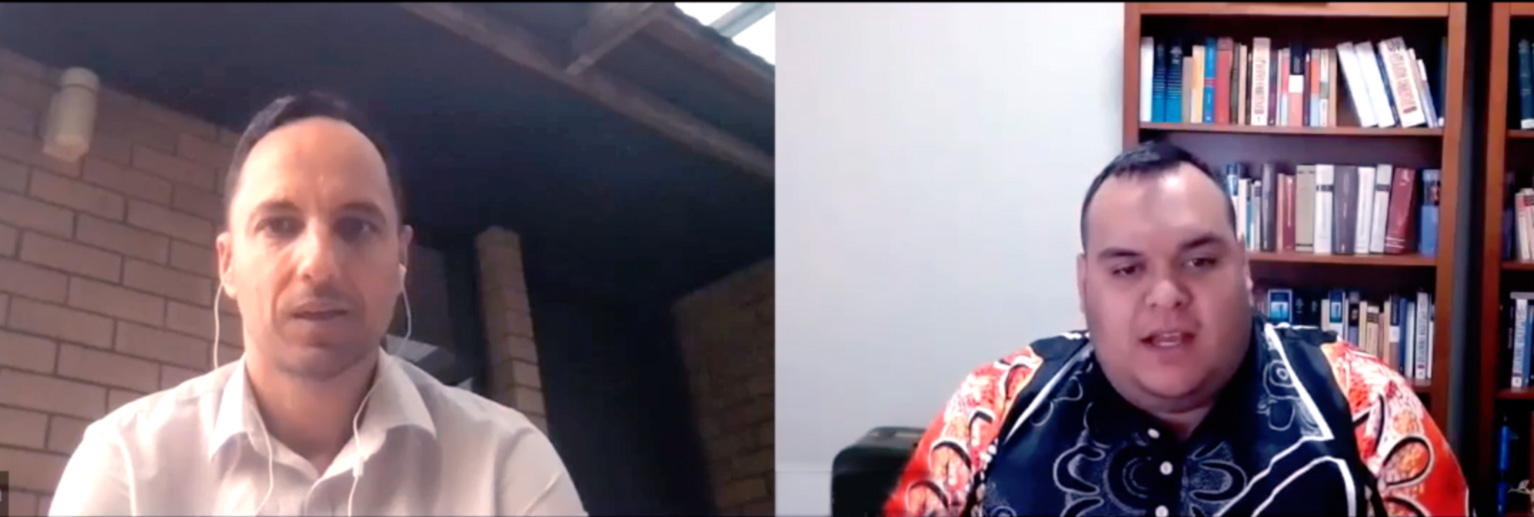How do our Aboriginal brothers and sisters feel about Australia Day? How can we support them and their ministry? TGCA CEO Akos Balogh spoke to Aboriginal Pastor Jum Naden to find out.
TGCA: Jum thanks so much for talking to TGCA. Whereabouts are you based, and what does your role involve?
Jum Naden: I’m an assistant minister here at St Peter’s Anglican Church in South Tamworth. I look after the evening congregation and head up the ‘Magnification’ ministry. I also head up the work in the suburb of Coledale, which is where a lot of the Aboriginal community live, also in South Tamworth. My wife and I have been in Tamworth since the beginning of 2019.
TGCA: Could you give us a snapshot of the state of Aboriginal Christianity and Aboriginal churches across our nation, and some of the joys and challenges that you’ve seen in your ministry and in ministries further afield?
Aboriginal people die younger than most people in this country. And so Aboriginal ministry is often done in the context of suffering and heartache
JN: I think it’d be fair to say that Aboriginal churches, for the most part, look elderly and mostly female. A lot of the ministers in the churches (where there are ministers) work secular jobs to support their ministries. With that comes joys and challenges.
The joys are the same as in all ministry: The joy of introducing people to Jesus and seeing them understand who Jesus is, and come to faith in him. Coming alongside people to know them and build relationships is also a great source of joy.
Some of the challenges are that Aboriginal people die younger than most people in this country. And so Aboriginal ministry is often done in the context of suffering and heartache. And so even yesterday, I was speaking to one of my friends, George Ferguson, who’s the minister at Walgett. It’s his first year in full-time ministry as an Aboriginal man, and this year he did 40 funerals.
TGCA: Identity is a big issue across our culture today, but I understand it’s especially a big issue for Aboriginal people. What about for you personally? How does the gospel impact your identity as an Aboriginal Australian?
I don’t leave my Aboriginal culture behind, but the gospel transforms and shapes that.
JN: Because of Jesus, and what he’s done for me at the cross, I’ve been adopted as a son of God. And that’s a wonderful thing. That’s an interesting thing—to think God has Aboriginal children—but he does, and I’m one of them. I don’t leave my Aboriginal culture behind, but the gospel transforms and shapes that.
TGCA: Among non-Aboriginal Australians, there’s an increasing sense of ambivalence to Australia Day because of what it represents to Aboriginal Australia. What are some of the views of Aboriginal people, including Aboriginal Christians, towards Australia Day?
JN: I think there are a wide range of views. But I would guess most of the Aboriginal community in Australia think we should celebrate what it means to be Australian on a different day. The majority of the Aboriginal community see the 26th of January as a day that marks the beginning of a lot of hurt and heartache for us as a people, including a loss of language and culture. We don’t celebrate boats arriving to these shores. And I think that would be the majority view of the Aboriginal Christian community as well.
TGCA: What do you usually do on Australia Day? Is there anything in particular that you and your family do?
JN: To be honest, I try to switch my phone off, because it is such a polarising day. Many people have strong opinions about Australia Day, and conversation around this can get quite hurtful.
Many people have strong opinions about Australia Day, and conversation around this can get quite hurtful.
I don’t think many good conversations can happen online about this. I’m much more interested in building relationships and sitting down and chatting together and thinking hard about what it looks like to live together, especially in the Christian community.
And so, my wife and I turn our phones off on Australia Day, and wait for the storm to pass.
TGCA: Hopefully this interview will spark some in-person conversations around Australia Day as we realise that, although Australia Day might have particular meaning for ourselves, it has a different meaning for others—especially our Aboriginal brothers and sisters. Shifting then to the topic of ministering the gospel to the Aboriginal peoples, what are some of the struggles you see in Aboriginal communities and in particular how the gospel addresses these struggles?
JN: There are a whole ranges of issues that aren’t unique to Aboriginal communities, but I think one of the big ones that isn’t spoken about as much, but is prevalent, is the struggle with identity and what it means to be an Aboriginal person in this country now. Aboriginal people see what’s going on as they watch the TV, and see how much activism there is, and it may shape who they are as a person. Not to mention being taught all sorts of things about culture and history, which also shapes them.
TGCA: There’s an increasingly popular ideology that says we shouldn’t bring ‘Western ideas’ such as the gospel to Aboriginal communities because it somehow upsets their Aboriginal identity. Is there a reluctance from Aboriginal people to accept the gospel, because they see it as a White Man’s thing, which they push back against more so than your average non-Aboriginal Aussie?
JN: Absolutely. Ideologies like Critical Race Theory and Postcolonial Theory become extremely polarising for Aboriginal communities. But when I talk to Aboriginal people about Jesus, they can’t say it’s merely a White Man’s religion. I have a completely different thing to say to them about what the Bible is, who Jesus is, than what the Media will say to them.
TGCA: Is there any particular way that you share the gospel with an Aboriginal person that might be different to how you share it with a white western person? Is there a particular angle that you come from or a particular aspect of the gospel you start with, for example, that might be different with Aboriginal compared to non-Aboriginal?
JN: No, I don’t think so. I just try to look for opportunities to point people to how Jesus can change and transform their lives in terms of what he’s done for them in regard to sin, and how he can bring joy and hope in the midst of suffering.
And yet, because Aboriginal people are naturally skeptical toward the gospel and White people in general, sharing the gospel is a ‘long game’. It’s very relational. So, we must keep that in mind, and not throw Aboriginal ministry and the Aboriginal community in the ‘too hard basket’. There’s no one that’s ‘too hard’ when it comes to the gospel because of what God has done in Jesus. And so, to really work hard at your relationships with Aboriginal people, by getting alongside them, caring for them and loving them is important when it comes to thinking about Aboriginal ministry.
TGCA: Few of our readers come from churches which have direct contact with Aboriginal communities around them, partly because there may be none. What are the ways that churches like these can help the spread of the gospel to Aboriginal communities?

There’s no church in this country that can lay claim to thinking there aren’t any Aboriginal people around them.
JN: I think there’s no church in this country that can lay claim to thinking there aren’t any Aboriginal people around them. Aboriginal people would have lived there in that place at one time. So, you could get to know the history of the place. Go and meet some people at your local Land Council and say hello. If there are no Aboriginal people around you, ask what does it look like then to support Aboriginal ministers and ministries as they seek to take the gospel to their own communities?
A lot of Aboriginal ministers are resource poor. Their time is taken up with secular work to put food on the table and to continue to be able to minister to Aboriginal communities. And as a result, the ministry suffers. In that sense, they’re not freed up to be able to go and do the work that God’s calling them to, because they’ve got to go and put food on the table for their families, which is the right thing to do. And the question might come as to why their local church isn’t supporting them. In most cases, their local church can’t. And so, this raises opportunities for partnership: better resourced churches could partner with Aboriginal churches and ministers. There are also Aboriginal organisations that help Aboriginal ministers take the gospel to their communities.
TGCA: What are some of those organisations?
JN: I’m a part of a fellowship called the Aboriginal Evangelical Fellowship of Australia. We run a conference every two years, which preaches to a whole bunch of Aboriginal people that come from right across the country. Bush Church Aid does a great job that supports ministry in rural areas, and Aboriginal communities, and helps fund positions for Aboriginal ministers.
At the moment, Moore College has two Aboriginal students going through. Ridley college in Melbourne also has a student.
It would be great if people could think about those things and be supporting them.
TGCA: Hopefully, some of our readers will take those opportunities because it’s so important to see the gospel spread among Aboriginal communities. There will be some churches that do have Aboriginal people around them, and so how can such a church become more welcoming towards Aboriginal people?
Be sure to go and say hello to Aboriginal newcomers. We love getting to know people, and love to chat.
JN: Be sure to go and say hello to Aboriginal newcomers. We love getting to know people, and love to chat. But like I said, it’s a long game. And so, continue to think hard about those relationships.
A lot of different people ask whether we should have a slide at the beginning of our church gatherings acknowledging Country. That might be good in some contexts. But I think for the most part, it’s about relationship and showing people that you care about them.
TGCA: It seems that it’s best for a church not just to wait for Aboriginal people to walk through the door, but to actually get out there into their community. In your experience, then, what are some helpful ways a church can do that?
JN: It’s all about meeting with people. Go down to your local footy game or going down to your local Land Council. Relationships take time and effort and can be really hard, but it is what we’re called to as gospel people. And that inevitably means trying to build relationships and work on those as you try to introduce people to Jesus.
TGCA: Now getting back to the broader political issues. Australia Day, as we mentioned, was one of them. How do you as an Aboriginal Christian, think through these issues? What sort of framework do you apply?
JN: I think I try to let Scripture frame my thinking. But I also try and think relationally about these issues, rather than just abstractly. And so, if I think about ‘reconciliation’ and what it looks like in this country, it’s an abstract term. And we can think about and talk about what that looks like all day and every day. But if I think about the question, ‘what does it look like to love my neighbour?’ that’s something different. Thinking abstractly vs thinking relationally aren’t mutually exclusive, but it’s a different way of thinking about things.
I think as a Church, sometimes we do a lot more of the thinking in abstraction rather than concretely. I think we have to do a better job on this front, especially in terms of thinking about relationships: what does it mean to forgive someone? What does it mean to repent of sin? And what does it look like then to live in light of those things, given the context that we’re in regarding the history between Aboriginal people in this country and non-Aboriginal people?
TGCA: To get very specific, then, what does repentance look like if I’m a non-Aboriginal Christian that’s part of a church that’s on land taken from Aboriginal people? What does repentance look like in that situation?
JN: I think it begins with recognition. So, repentance, biblically speaking, is a recognition. You’re confronted with your sin, which you recognise as wrong and offensive to God. I think it’s the same in relationships as well. Recognition is the beginning of repentance. Where it leads to from that is a massive discussion, and I don’t have all the answers. But it is something that we need to think harder about as people showing the rest of the world that in the gospel, in knowing Jesus, there is an answer there. This doesn’t mean it’s going to be perfect and it doesn’t mean that it’s going to fix everything at once.
But it’s all heading to a point, when Aboriginal and non-Aboriginal will be praising God around his throne. But we continue to work hard at things here and now.
TGCA: Is there anything else you think would be helpful for our non-Aboriginal Christian audience as we think about the gospel, and Aboriginal Australia?
JN: I think working hard at loving Aboriginal Australia. In all ministries there’s a cost involved. Not only that, but supporting Aboriginal ministries that are already up and going. There are a lot of Aboriginal ministers all over the country, that would love for churches to get in touch with them to think about partnership.
Going forward, that’s going to be one of the most effective things we can do as God’s people, because the big question culturally is how can we come together as black and white? How do Australia and Aboriginal Australia come together? As God’s people, we have the answer to that: the gospel. It’s what God has done for both of us, in Jesus. And if the church continues to work hard at showing that to the rest of the world, it’s going to be a massive wakeup call to what people think reconciliation looks like, and how it’s supposed to work.
TGCA: Thank you for your time, Jum. We thank God for the ministry you’re doing among the Aboriginal people in your context, and for the many Aboriginal pastors and churches around Australia that are bringing the gospel to their communities.
The full video from which this transcript is taken will be available on the TGCA Facebook page from 12pm on the 26th of January, 2021.















